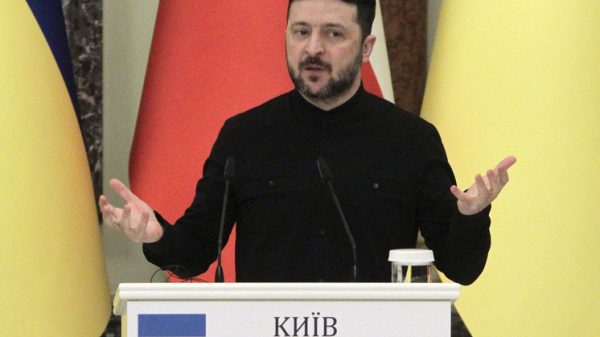With the discovery of new coronavirus variants in parts of the UK, prompting intensive testing, we take a look at what the variants are and how concerned we should be.
What do we mean by a variant?
The terminology around viruses can be confusing, and certain terms are still debated among experts. But the general picture resembles a set of nested dolls.
“You have got the coronavirus family and one strain is MERS, one strain is Sars-CoV-1, one strain is Sars-CoV-2 and another strain would be OC43 – one of the common colds,” said ProfLawrence Young, virologist and professor of molecular oncology at the University of Warwick.
Each strain, said Young, encompasses a number of variants. These variants differ by the set of mutations they contain – in other words the changes in their genome.
Some of these mutations are “silent” – in other words they have no effect on the way the virus functions, but others can be important, for example changing parts of the virus that affect how easily it spreads between people. Different variants have a different collection of mutations, but they may have some changes in common with each other.
While the word variant could be applied to any mutant form of the same strain, experts say the term has come to mean something different.
It is a nuance that caught out Nadhim Zahawi, the UK vaccines minister, who said on Wednesday there are 4,000 variants across the world.
“The vaccine minister is not referring to variants as we have come to know them, rather he is referring to individual mutations,” said Prof Ravi Gupta, professor of Microbiology at the University of Cambridge.
“The number of mutations has little actual relevance as many mutations emerge and disappear continuously. Scientists are using ‘variants’ to describe viruses with mutations that are transmitting in the general population – there aren’t 4,000 of those.”
Which variants are of particular concern?
In the UK all eyes are on a handful of new variants of the coronavirus Sars-CoV-2, commonly known by the locations in which they were first detected. At present, key variants of concern are the South African variant (501Y.V2), the Brazilian variant (P.1) and the Kent variant (B117).
These variants contain a range of mutations – some of which are worrying. Both the South African variant and the Kent variant contain a mutation called N501Y, which is believed to make the virus more contagious than older variants.
The South African variant also contains mutations known as E484K and K417N, which appear to make the virus better able to evade neutralising antibodies produced by the body, suggesting current Covid vaccines will prove less effective against this variant. The Brazilian variant also contains E484K and N501Y as well as another mutation of concern called K417T.
This week it was revealed that the E484K mutation has also emerged in the Kent variant – although this has only been detected in a small number of cases so far.
Is the fact that the variants seem to be developing similar mutations a concern?
Experts say the development is not surprising, noting that some parts of a genome are more prone to mutation, while similar mutations would be expected to crop up when the virus experiences similar evolutionary pressures.
“There is selection going on for better viruses, viruses that are fitter for either transmissibility and/or immune evasion, and it is not surprising to see common changes occurring during that selection or adaptation process,” said Young.
Deenan Pillay, a professor of virology at University College London said the E484K mutation was a good example of this. “The fact that there is this common convergent evolution, it means that this is a common way in which the virus can escape the antibodies that are currently circulating, either from previous infection [or through vaccination],” he said.
Some mutations result in variants of concern – for example the higher transmissibility of the Kent variant is believed to be one factor behind the rapid uptick in infections in the UK this winter, while mutations that help a variant to evade neutralising antibodies might affect how much protection current Covid vaccines can provide.
There is also a concern, said Young, that the emergence of different variants may increase the chance of someone getting Covid a second time.
However, there is a flipside: known mutations make it easier to predict how a new variant might behave, while it also means vaccines can be tweaked to take into account common new mutations and boost protection against several new variants at once.
And there is more. “As the virus becomes more adapted to us, and more transmissible, it might cause less disease, not more disease,” said Young, adding that has been found to be the case with some other viruses.
How concerning are the new variants when it comes to Covid vaccines?
Lab tests involving the Pfizer /BioNTech and Moderna vaccines – both of which have been licensed in the UK – have suggested that jab might have a slightly lower efficacy towards the South African variant than older variants.
Meanwhile results from the Novavax Covid vaccine trials, involving two shots of the jab, found that vaccine had 95.6% efficacy against the original coronavirus, 85.6% against the Kent variant and 60% against the South Africa variant. The single-shot Janssen vaccine from Johnson & Johnson also had a reduced efficacy against the South Africa variant, but still offered 57% protection against moderate to severe Covid infection 28 days after vaccination.
“60% is what you get with the annual flu jab,” said Young, adding that is still a good level of protection. “I don’t think we should be panicking as much as people are at the moment about it actually.”
Pillay added that many Covid vaccines target the spike protein, which sits on the surface of the coronavirus. Crucially, he said, the antibodies generated in response to the vaccine target many different parts of this protein, meaning a change in one region as a result of a mutation would be unlikely to mean the variant can evade all the different antibodies.
But as more mutations accumulate, it is possible vaccine efficacy could fall further. Scientists are working towards developing new versions of Covid vaccines tweaked towards new variants, with one possibility that vaccines could be targeted at more than one type of the spike protein.
Young said another approach would be to create vaccines that target several different parts of the virus – not just the spike protein on its surface.
Should we be more worried about variants from overseas or homegrown variants?
Pillay said while variants are often linked to particular locations, that did not mean that is where they arose. “Wherever there are a large number of infections and you are sequencing them, you are going to find [these new variants],” he said.
Stopping the emergence of new variants is no mean feat. “The only way you can stop new variants is by stamping out the virus because the more the virus is allowed to spread … the more chances it has to evolve and form new variants,” said Young.
That, he said, means getting vaccines into arms, while also sticking to other measures to prevent spread, including social distancing.
Pillay added that a well functioning test, trace, isolate and support system was also crucial, as were measures at the borders. “You need to close the borders, absolutely, to stop these [variants] spreading across borders,” he said.

























































Свежие комментарии